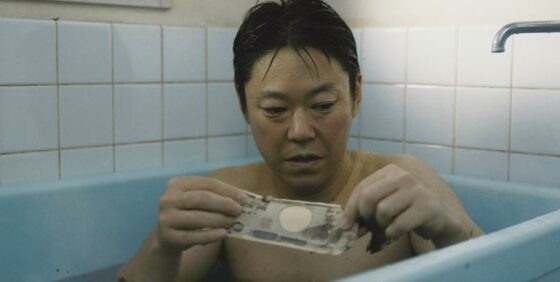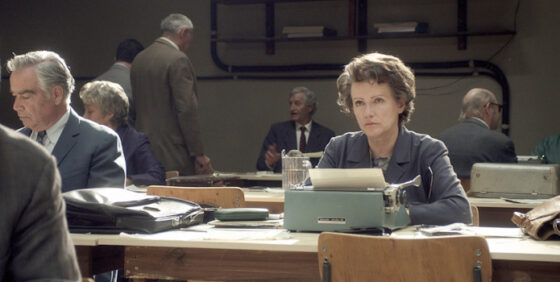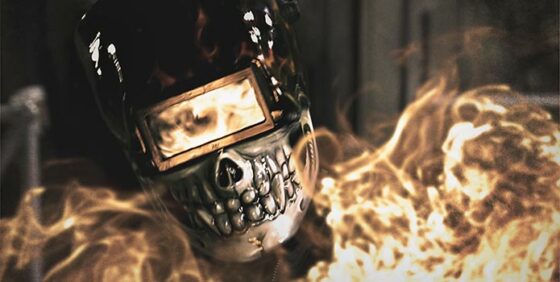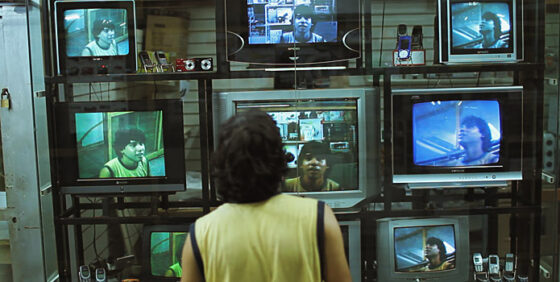TIFF Day 7: Augustine | The Bright Day | Camion | The Color of the Chameleon | Do Not Disturb | Dreams for Sale | Hannah Arendt | John Dies at the End | A Liar’s Autobiography | 7 Boxes
Augustine (Alice Winocour, France)—Discovery
By Adam Nayman
Less Prestige-ious than David Cronenberg’s recent period-piece account of psychoanalytic one-upsmanship, the pre-Freudian drama Augustine actually gets down and dirty with its (diagnosed) hysterical female patient: a 19-year-old maid whose spectacular seizure suffered while ladling out supper to her employers gets her packed off to a sanatorium. Once there, she’s submitted to a battery of tests, one of which involves her standing naked whilst an older male physician traces lines on her body; credit Alice Winocour for directing the scene so that the most salient bodily feature is Augustine’s nervously clenched right eye, a suggestion that this frightened girl can barely even see the half of her situation.
No less than Julia Leigh’s Sleeping Beauty, Augustine is a Cannes-ratified film by a first-time female filmmaker that locates the scary eroticism in powerful males lording over (and lusting after) supine female beauty; the difference is it’s not a pretentious, cattle-prod-subtle crock of shit. Working in a muted, misty-green visual style that doesn’t call attention to its own virtuosity, Winocour gets us onside with her heroine (played by the singer Soko) without caricaturing Vincent Lindon’s Jean-Michel Charcot—a real 19th-century French physician known for elaborately mounted presentations of his patients—as a grabby creep. Charcot’s belief that Augustine can be cured via displays of control (in every way from overseeing her stay at the asylum to literally hypnotizing her) is in the service of relatively progressive ideas; the final showdown, where Augustine refuses to meet his gaze (this time with both eyes wide open) is as much about his recognizance of her power as it is a refutation.
The Bright Day (Mohit Takalkar, India)—City to City: Mumbai
By Adam Nayman
Shiv, the 23-year-old protagonist of The Bright Day, wants to “find his own note” and he doesn’t want “to be a square”; he wants a dog, a tortoise, and a cat; he desires to be an ascetic when he grows up, and he wouldn’t mind hooking up with the white-skinned American hottie who asked for the wish-list in the first place. Oh, and if he could comfortably and definitively find himself in around ninety briskly paced and luminously shot minutes, well, that’d be just swell.
The backstory on The Bright Day is that rookie director Mohit Takalar backpacked across India with his lead actor, Sarang Sathaye, inventorying situations that could eventually form the spine of a narrative feature. The eight-year lag time between their trip and the production of the film surely speaks to the difficulty of making this kind of modest independent cinema in a country better known for its industrial spectaculars, and while The Bright Day has about it the pungent whiff of sincerity, it also seems that this interval has resulted in a certain over-shaping and banalizing of the filmmakers’ experiences. Shiv’s stagy confrontations with his indulgent parents, who want him to get off his ass and stop playing the role of the stifled dreamer, don’t exactly get the film off on a naturalistic note. And while the DV location shooting (in Jaisalmer, Pune and Varanasi, though oddly not Mumbai, given the film’s City to City slot) is casually accomplished, it never really feels like we’re experiencing the culture along with the character. Instead, the film follows exactly the sort of predictable arc that its existentially restless main character is trying to break from: setbacks and epiphanies arrive on cue underneath soundtrack cuts that literalize the themes from scene to scene. Sathaye alternates between a furrowed brow and a beatific grin with nothing in between, and the actress playing the girl he leaves behind sheds a truly amazing amount of tears during their protracted farewell—a veritable deluge.
Camion (Rafaël Ouellet, Canada)—Contemporary World Cinema
By Michael Sicinski
A slight, downbeat dramedy, Camion is a film that comports itself as though it were examining depression while in fact it pretty much exemplifies it. It’s slow and shambling without ever achieving grace, its characters nominally sympathetic without ever really individuating themselves. All of which is to say, Ouellet’s film, most likely without intending to, takes the rut of its three male protagonists and makes that rut a formal principle, mapping that ennui directly onto Camion’s articulation of time (dull) and space (cold and flat). The eponymous truck belongs to Germain (Julien Poulin), an aging widower who transports lumber. In the opening moments of the film we’re given its finest piece of staging, as a car slams head-on into Germain. The other driver was at fault, and she’s killed instantly; nevertheless, Germain quits driving, and generally begins shutting his whole world down out of fear. To help him through, his two adult sons Alain (Stéphane Breton) and Sam (Patrice Dubois) put their own lives on hold to reconnect with the old man. Alain, disabled in a mugging, is a directionless barfly; Sam is a night janitor who never got over his first girlfriend. Ouellet is clearly aiming for a poignant, freeform study of stunted masculinity, but for the most part Camion just lies there, muffled by a passive-aggression typical of so much Canadian cinema. It throws out half-baked quirks and then shyly reels them back in again, as if embarrassed by its blatant desire to please.
The Color of the Chameleon (Emil Christov, Bulgaria)—Discovery
By Michael Sicinski
Since black-comic post mortems of nefarious doings in the old Soviet Bloc are all the rage, why shouldn’t Bulgaria get into the act? (I suppose we could count 2008’s Zift, but honestly, that was just a meathead flick with communism dolloped on like rancid sour cream.) This flawed but generally sharp debut feature by cinematographer Christov sort of starts out like a bureaucratic riff on the old Adrian Pasdar series Profit. Eventually, the genially amoral film mutates into a rather diverting Burn After Reading-lite for the Warsaw Pact set. Our anti-hero, Batko Stamenov (Ruscen Vidinliev), was a near-silent but highly intelligent young boy who couldn’t stop masturbating. His adoptive-aunt-cum-real-mother (it’s complicated) seeks help, and in the end he works it out by channeling his obsessive onanism into Good Communism. That means withdrawal, dissimulation, and the studied replication of actual human behaviour.
In short, Batko is a husk, plucked out of university by a secret police operative to spy on his subversive classmates. Their “Club for New Thinking” is based on a loopy Russian novel that postulates workers’ rebellion and wild sex. Christov’s unique approach, however, comes at the midpoint of the film, when a nosy landlady gets Batko kicked out of the “real” secret police. But why should he let that stop him? The hyper-resourceful and endlessly clandestine former agent simply invents his own micro-agency, “SEX,” with which to elicit confessions and instigate double-crosses from everyone around him. This Dutch-doll, fake-agent-real-agent structure could be a satire regarding post-communist accountability, although Christov seems only nominally interested in the actual political stakes of this material. Rather, it’s a scuzzy riff on spy-vs.-spy gamesmanship. Here we have a film that gleefully erases its protagonist practically as an afterthought because, like him, The Color of the Chameleon gets over with calculated disinvestment.
Do Not Disturb (Yvan Attal, France)—Special Presentation
By Jason Anderson
Believing that a movie as minor as Humpday (2009) calls out for a French-language remake is the first of many bad ideas in the latest by Yvan Attal, who continues to prove that he’s slightly more useful as an actor than a filmmaker. His biggest flub is trading in Lynn Shelton’s mumblecore shambling for a more commercial, star-flattering packaging. By doing so, Attal decimates the casual tone, easy charm and other elements which helped compensate for the thinness of the material and the discomfiting edge of gay panic which informs both proceedings. Attal casts himself as Ben, the more domesticated of two straight friends who reunite and make a drunken pact to make a porno together as a means to reassert artistic and personal ideals that have long since faded from their lives. The fact that Ben and pal Jeff (François Cluzet) are at least a decade older than Mark Duplass and Joshua Leonard’s characters emphasizes the premise’s air of bad-sitcom contrivance. As before, it’s the women who are more intriguing, though they too are fouled up by Attal’s meddling. Wearing glasses in a vain attempt to disguise the fact that she’s Laetitia Casta, Laetitia Casta displays some pluck as Ben’s wife. Meanwhile, Attal’s actual wife Charlotte Gainsbourg achieves several career milestones in her role as one of the bohemian artist types who encourage the men to try fucking each other: not only does she make out with Asia Argento, she gets to wear both a breast pump and a strap-on. All this raises the intriguing possibility that Do Not Disturb is not a remake of Humpday but a prequel to Nymphomaniac.
Dreams for Sale (Nishikawa Miwa, Japan)—Special Presentation
By Adam Cook
The tone of Nishikawa Miwa’s Dreams for Sale is far less outlandish than the premise might lead one to believe. After a married couple’s restaurant burns down, they turn to unconventional methods to try and get the dough necessary to start again. The husband, Kanya, begins manipulating lonely women into falling in love with him and marrying him with the intention of taking their money—and all with the consent of the wife, Satoko, who just wants things to be as they were before. It’s a rather biting take on the demands, responsibilities and expectations of marriage and the toll they can take on a couple. Of course, things do not go smoothly, and their trust is pushed to its very limits as their relationship becomes increasingly complicated. The growing tensions between Kanya and Satoko (who are each realized with considerable skill by Abe Sadao and Matsu Takako, respectively) keep the film dramatically taut, even as it overstays its welcome with an undisciplined 137-minute running time, much too long for such a relatively small story.
Nishikawa isn’t going to impress too much with any bold choices, but she doesn’t really falter either, colouring perfectly within the lines and delivering something distinctly watchable, if ultimately forgettable. It’s a safe choice, an entertaining diversion with some good performances, but in TIFF’s bloated behemoth of a lineup, there are undoubtedly better dreams for sale.
Hannah Arendt (Margarethe von Trotta, Germany)—Special Presentation
By Richard Porton
Like Rosa Luxemburg (1986), her earnest but clumsy biopic inspired by the life of the great German revolutionary, Margarethe von Trotta’s Hannah Arendt embodies the paradoxical perils of a “Great Woman” theory of history. By attempting to provide a humanizing feminist gloss—where the cozy preoccupations of “the personal” take precedence over politics and the life of the mind—the work of one of the twentieth century’s most combative thinkers is sentimentalized and trivialized. Why should the average filmgoer care that many of Arendt’s friends abandoned her after Eichmann in Jerusalem was serialized in The New Yorker when her most controversial assertions—concerning the collaboration of the Jüdenrat with Nazi officials, and, of course, the “banality of evil”—are invoked without being adequately explained? In addition, given the clunky flashbacks chronicling Arendt’s youthful romance with Martin Heidegger, the father of existentialism who became a member of the Nazi Party in 1933, the naive viewer might well accept the baseless accusations of former allies like Hans Jonas and Gershom Scholem that she had become a self-hating Jew.
There is admittedly a certain kitschy appeal to what might be the only film that will ever feature Mary McCarthy, William Shawn and Norman Podhoretz as supporting characters—even if McCarthy (as played by Janet McTeer), one of the wittiest American writers of the post-WWII era, is reduced to functioning as a gangly Agnes Gooch to Arendt’s dour version of Auntie Mame. With its conservative aesthetic and simplistic ideas concerning intellectual inquiry, von Trotta’s stolid movie is as old-fashioned as any ’30s biopic. And despite Barbara Sukowa’s game performance as the crusty philosopher, this is a film destined to please no one: Arendt aficionados will find it hopelessly cartoonish, while everyone else will merely shrug their shoulders.
John Dies at the End (Don Coscarelli, USA)—Midnight Madness
By Nadia Baldini
Don Coscarelli began his career with the extraordinary Phantasm (1979), a crude and cobbled-together curiosity that created a dreamlike atmosphere both frightening and poetic, and explored the fears of childhood with imagery that earned the comparison to The Night of the Hunter (1955), albeit a DC Comics version. After making something of a return with Bubba Ho-Tep (2002), the prospect of him tackling John Dies at the End—a story about drugs and hallucinations, based on a novel by David Wong that at one time interested David Fincher—seemed like a match made in heaven
Unfortunately, John Dies at the End fails to renew the miracle. Clearly uncomfortable with literary material, Coscarelli has made an ill-conceived adaptation. The screenplay delivers its best ideas at the beginning of the film (a monster made up of pieces of meat, a hamburger phone). As a whole, it is much too talkative and visually cheap; the film withers before one’s eyes as the story becomes more and more confusing and boring. John Dies at the End is one of those dark, mischievous drug films where the viewer comes to expect to see anything and everything on the screen, since the characters are constantly stoned or suffering full-blown hallucinations. One does not doubt Coscarelli’s sincerity, as he remains a real artisan working on the margins of American cinema, but here he unfortunately has missed his target. John Dies at the End will no doubt disappoint Coscarelli’s admirers, which is even sadder considering that, on average, he directs one film every 10 years.
A Liar’s Autobiography – The Untrue Story of Monty Python’s Graham Chapman (Ben Timlett, Bill Jones, Jeff Simpson, UK)—Special Presentation
By Michael Sicinski
Some of you may recall that back in April, some sly joker posted a “leaked” version of the Cannes Competition lineup they’d allegedly pulled from the festival’s website following a glitch. It was a hoax, but an informed one. Of the 24 titles listed in the made-up Comp slate, seven actually were in the final group, while several others, such as The Master, have since emerged as key films of the year. If there is one single outlier in the “slate,” it has to be A Liar’s Autobiography, which seemed at the time like the Cannes-troll’s attempt at a left-field selection but now seems only comical and sad, proof positive that Nobody Knows Anything, even when they’re making it all up. Drawn from recently discovered audiotapes of the late Chapman reading from his 1980 Liar’s Autobiography (Volume VI), ALA:TUSOMPGC takes material that one would expect to be inherently funny—observations about drunken debauchery and copious gay sex from one of the guys responsible for “The Parrot Sketch” and “The Spanish Inquisition”—and attenuates them into a gruelling 82-minute slog. The film is weighted wall-to-wall with tedious detail from, let’s face it, a minor celebrity, whose own sense of self-importance receives free-range grazing room here, and it certainly doesn’t help matters that ALA:TUSOMPGC is gracelessly animated with a hacky, computer-cutout style reminiscent of those viral JibJab guys who were popular a few years back. (And look! Since it’s just a bunch of flat pictures floating around a virtual copystand, we can make it “3-D”!) If you think that seeing lots of giant cartoon cocks and balls flying around (tee-hee!) represents the forefront of queer liberation, reserve your tickets now. If you aren’t a tittering ten-year-old schoolboy, don’t waste your time.
7 Boxes (Juan Carlos Maneglia, Tana Schémbori, Paraguay)—Discovery
By Tom Charity
Filmed almost entirely within the central market in Paraguay’s capital, Asuncion, 7 Boxes aims for a crowd-winning slumdog combination of off-the-cuff neorealism and larky thriller dynamics, and gets at least halfway there. 17-year-old Victor (Celso Franco) is a barrow boy, literally a wheeler dealer, who gets his big break when a shady restaurateur offers him $100 US to babysit seven boxes for a few hours in case the cops search his premises; not such an easy task in a city where crime is rife and rival barrowmen guard their turf jealously. Directing team Juan Carlos Maneglia and Tana Schembori put half a dozen characters at cross-purposes and send them careening through the maze-like market mostly on foot, often pushing a wheelbarrow before them. It’s ingenious and dumb in about equal measure; they make a hash of the big reveal (what’s in the boxes?) and rely on too many chase scenes and footloose camera angles to keep up the energy level. The performances are all over the map too, but Franco and especially Lali Gonzalez as Victor’s refreshingly unglamorous girlfriend/sidekick have charm and charisma enough to make you care when the bullets start to fly. In the boldest twist, while the heavy wants to get his hands on the merchandise to buy drugs for his sick baby, Victor’s motivation is to purchase a second hand cell phone to make his own movies.
cscope2











